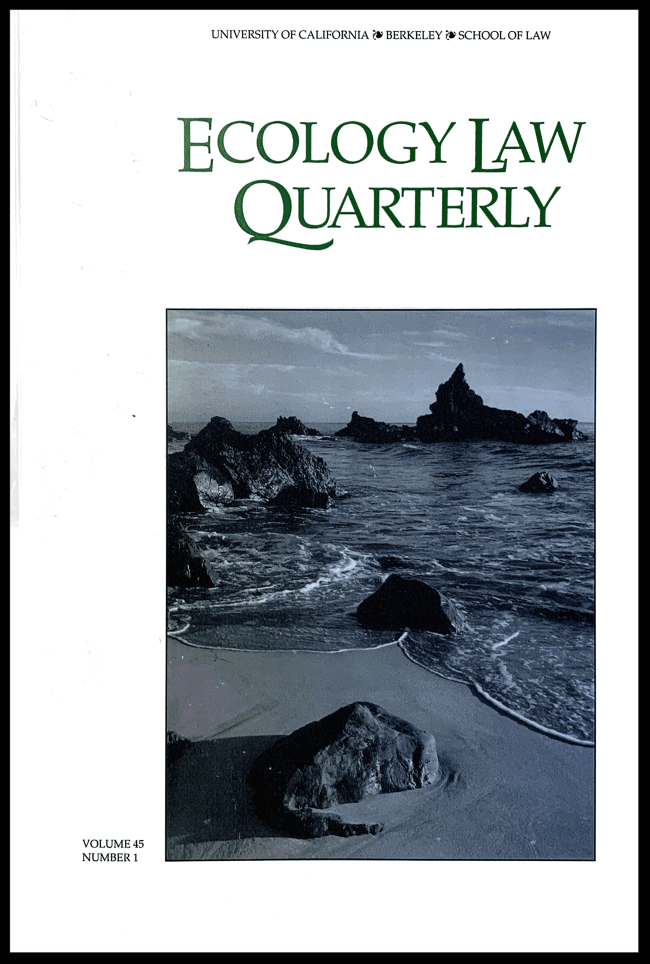| |
Oceans and a Changing Climate

T
he ocean is not insulated from climate change. They may be less directly visible to land dwellers, but climate impacts on the ocean carry frightening ecological and economic risks. From increasing ocean acidity, disappearing corals, and depleted fish stocks to rising sea levels and surface temperatures, climate change is altering the ocean in deeply significant and wide-reaching ways. Furthermore, the actions we take at sea - from shipping emissions to renewable energy - affect our ability to reduce global emissions. Despite this, ocean governance remains largely isolated from climate policy.
A recent
special issue of
Ecology Law Quarterly
draws on the expertise of ocean law scholars to form a more integrated and better coordinated response. Covering topics from the interplay between climate change and fisheries to ocean acidification governance to incorporating climate into environmental assessments at sea, the authors examine how evolving conditions affect resources, areas, communities, and activities that we have traditionally managed discretely on a sector basis.
This law review issue draws on the discussions fostered at last fall's international conference in Malmö, Sweden. A partnership between
Berkeley Law's Law of the Sea Institute, the World Maritime University, and the Korea Institute of Ocean Science and Technology, we invited international ocean law experts and leading climate change scholars to a discussion of key issues
at the intersection of ocean and climate governance. C
onference participants examined international, regional, and domestic governance initiatives related to oceans and climate change. They identified best practices, governance gaps, and potential or existing linkages between the myriad of regulatory and policy frameworks that subsist across scal
es and sectors. The res
ult was a narrative map of relevant law and policy initiatives and how they link to existing legal regimes and broader climate change efforts.
We hope that we are witnessing the beginning of a global dialogue on these critical issues. The future of the ocean depends on it.
NOAA measurements of sea surface temperature anomalies, where positive means warmer-than-usual and negative means cooler-than-usual (NOAA/NESDIS, Dec. 2018)
|
WE'RE HIRING!
OPPORTUNITY: OCEAN LAW & POLICY FELLOW
|
We are excited to announce that we are hiring an Ocean Law & Policy Fellow to join our team at CLEE. The fellow will conduct research on ocean law and policy, draft white papers and reports, and assist with convenings and workshops. This is a full-time, one-year contract position, with the possibility of renewal.
For more information and to apply, please find the job posting here
|
|
Faculty + Staff
In the News
|

Dan Farber considers the
potential
impact of the upcoming Supreme Court case,
Juliana vs. the United States
, in an article by Law 360.
|

Jordan Diamond is the co-editor of Stress-Testing the Law of the Sea. (Brill 2018), which examines how international ocean governance may need to adapt in light of changes in technology, geopolitics, and the environment.
|

On KPFA's show Talkies, Ted Lamm converses on California's process towards renewable energy, and policy issues and solutions associated with solar development.
|

Ethan Elkind hosts a discussion on what the newly elected US Congress will look like, with representatives Anna Eshoo (CA-18) and Jared Huffman (CA-2) and Berkeley professor Eric Schickler on
City Visions.
|
CLEE is dedicated to developing pragmatic policy solutions to critical environmental and energy challenges, and to supporting the education of tomorrow's leaders in this field. If you would like to support these efforts, please consider making a one-time or recurring donation through
our giving portal.
Any gift, no matter the size, is deeply appreciated. We are independently funded from the university, and we wouldn't be here today - and won't be here tomorrow - without you.
|
|
|
|
| |
|
|